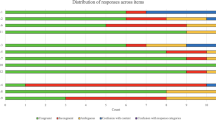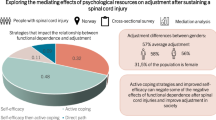Abstract
Study design: Cross-sectional.
Objectives: In a previous study we found spinal cord lesion (SCL)-related coping factors to be distinctly related to levels of SCL-related psychological outcome. However, we did not control for other potentially confounding variables. In this study we investigated effects of coping strategies on psychological outcome reactions in traumatically spinal cord lesioned persons controlling for sociodemographic, disability-related and social support variables.
Setting: The Gothenburg Spinal Injuries Unit in Sweden.
Methods: The study sample comprised 255 persons and a subsample of 157 persons. A series of stepwise multiple regression analyses were performed.
Results: SCL-related coping factors clearly predicted psychological outcome even when background variables were controlled. Higher levels of acceptance coping predicted decreased psychological distress and increased positive morale. Elevated social reliance coping predicted heightened distress. Higher levels of social support predicted lower feelings of helplessness. Sociodemographic and disability-related variables were weak predictors of psychological outcome with one exception: higher education predicted less bitterness and brooding.
Conclusion: SCL-related coping remained the most important predictor of psychological outcome even when a wide range of variables was controlled. Thus we conclude that psychosocial interventions aimed at helping individuals develop their coping strategies might be of substantial value in their adjustment to SCL.
Similar content being viewed by others
Log in or create a free account to read this content
Gain free access to this article, as well as selected content from this journal and more on nature.com
or
References
Elfström ML et al. Linkages between coping and psychological outcome in the spinal cord lesioned: development of SCL-related measures Spinal Cord 2002 40: 23–29
Frank RG et al. Differences in coping styles among persons with spinal cord injury: A cluster-analytic approach J Consult Clin Psychol 1987 55: 727–731
Wineman NM, Durand EJ, Steiner RP . A comparative analysis of coping behaviors in persons with multiple sclerosis or a spinal cord injury Res Nurs Health 1994 17: 185–194
Folkman S, Lazarus RS . If it changes it must be a process: A study of emotion and coping during three stages of a college examination J Pers Soc Psychol 1985 48: 150–170
Mishel MH . Uncertainty in illness Image Nurs Sch 1988 20: 225–232
Parker JDA, Endler NS, Bagby RM . If it changes, it might be unstable: Examining the factor structure of the Ways of Coping Questionnaire Psychol Assess 1993 5: 361–368
Folkman S, Lazarus RS . Manual for the Ways of Coping Questionnaire Consulting Psychologists Press: Palo Alto 1988
Carver CS, Scheier M, Weintraub K . Assessing coping strategies: A theoretically based approach J Pers Soc Psychol 1989 56: 267–283
Kennedy P, Lowe R, Grey N, Short E . Traumatic spinal cord injury and psychological impact: a cross-sectional analysis of coping strategies Br J Clin Psychol 1995 34: 627–639
Kennedy P et al. A longitudinal analysis of psychological impact and coping strategies following spinal cord injury Br J Health Psychol 2000 5: 157–172
King C, Kennedy P . Coping effectiveness training for people with spinal cord injury: preliminary results of a controlled trial Br J Clin Psychol 1999 38: 5–14
Elliott TR et al. Social support and depression following spinal cord injury Rehab Psychol 1992 37: 37–48
Schulz R, Decker S . Long-term adjustment to physical disability: the role of social support, perceived control, and self-blame J Pers Soc Psychol 1985 48: 1162–1172
Lazarus RS, Folkman S . Stress, Appraisal, and Coping New York: Springer 1984
Folkman S . Positive psychological states and coping with severe stress Soc Sci Med 1997 45: 1207–1221
Gerhart KA et al. Correlates of stress in long-term spinal cord injury Spinal Cord 1999 37: 183–190
Ditunno JF, Young W, Donovan WH, Creasey G . The international standards booklet of neurological and functional classification of spinal cord injury Paraplegia 1994 32: 70–80
Henderson S, Duncan-Jones P, Byrne DG, Scott R . Measuring social relationships. The interview schedule for social interaction Psychol Med 1980 10: 723–734
Karlsson J, Sjöström L, Sullivan M . Swedish obese subjects (SOS)–An intervention study of obesity. Measuring psychosocial factors and health by means of short-form questionnaires. Results from a method study J Clin Epidemiol 1995 48: 817–823
Frank RG, Elliott TR . Spinal cord injury and health locus of control beliefs Paraplegia 1989 27: 250–256
Krause JS, Crewe NM . Chronological age, time since injury, and time of measurement: Effect on adjustment after spinal cord injury Arch Phys Med Rehab 1991 72: 91–100
Krause JS, Dawies RV . Prediction of life satisfaction after spinal cord injury: A four-year longitudinal approach Rehab Psychol 1992 37: 49–59
Levi R, Hulting C, Nash MS, Sieger Å . The Stockholm spinal cord injury study: 1. Medical problems in a regional SCI population Paraplegia 1995 33: 308–315
Levi R, Hulting C, Sieger Å . The Stockholm spinal cord injury study: 4. Psychosocial and financial issues of the Swedish annual level-of-living survey in SCI subjects and controls Paraplegia 1996 34: 152–157
Westgren N, Levi R . Quality of life and traumatic spinal cord injury Arch Phys Med Rehab 1998 79: 1433–1439
Author information
Authors and Affiliations
Rights and permissions
About this article
Cite this article
Elfström, M., Kreuter, M., Rydén, A. et al. Effects of coping on psychological outcome when controlling for background variables: a study of traumatically spinal cord lesioned persons. Spinal Cord 40, 408–415 (2002). https://doi.org/10.1038/sj.sc.3101299
Published:
Issue date:
DOI: https://doi.org/10.1038/sj.sc.3101299
Keywords
This article is cited by
-
Autonomic variability, depression and the disability paradox in spinal cord injury
Spinal Cord Series and Cases (2022)
-
The reliability and validity of the International Spinal Cord Injury Quality of Life Basic Data set in people with spinal cord injuries from a middle-income country: a psychometric study of the Thai version
Spinal Cord (2020)
-
Peer mentorship for adults with spinal cord injury: a static group comparison between mentees and non-mentees’ reported coping strategies
Spinal Cord (2018)
-
A validity study of the Spanish—World Health Organization Quality of Life short version instrument in persons with traumatic spinal cord injury
Spinal Cord (2018)
-
Hope, coping and psychosocial adjustment after spinal cord injury
Spinal Cord Series and Cases (2017)



